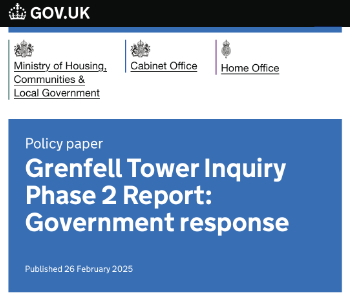Scope of work
The Association for Project Management describes ‘scope’ as ‘The totality of outputs, outcomes and benefits and the work required to produce them’ and ‘scope management’ as ‘The process whereby outputs, outcomes and benefits are identified, defined and controlled’.
In construction, the term ‘scope of work’ (sometimes described as a ‘scope of works’, ‘statement of work’ or 'terms of engagement') is a very general, and sometimes ambiguous term referring to a general description of the work that is expected to be performed under a particular contract. It may be prepared by the client or their consultants and included in tender documentation for construction works.
The nature of the scope of work can vary significantly from project to project. Sometimes it will simply offer a very broad description of the works required, whilst sometimes it provides a complete description of the project, significant milestones, a programme of work with the expected time frames for delivery, reports, pricing, deliverables, roles and responsibilities and end products that are to be provided.
For more information, see What should be included in a scope of work?
A scope of work can be a useful way of agreeing broad project requirements for both the client and supplier. However, errors or inconsistencies with other contract documentation can lead to confusion and uncertainties which are often cited as a cause of disputes on construction projects.
It is common for changes to be required to the scope of work after the contract has been awarded. Most forms of contract make provisions for the contract administrator to instruct reasonable variations which may give rise to additions or deductions from the contract sum, however, these variations must not change the nature of the works themselves. In some cases, the works may be tendered before the scope of work is known in detail. In this case, provisional sums may be included in the contract, or flexible procurement routes adopted such as measurement contracts or prime cost contracts.
The term ‘scope of work’ is generally used to refer to construction activities, however, a ‘scope of services’ which describes the services a consultant will be performing on a project may also sometimes be referred to as a scope of work.
Confusingly, the term ‘scope of work’ can also used interchangeably with the term ‘schedule of work’. However, a schedule of work has a more specific meaning, referring to 'without quantities' instructional lists often produced on smaller projects or for alteration work as an alternative to bills of quantities, allowing the pricing of items such as builders work and fixing schedules.
[edit] Related articles on Designing Buildings Wiki.
Featured articles and news
Sustainable Urban Drainage and Biodiversity
Awards for champions of these interconnected fields now open.
Microcosm of biodiversity in balconies and containers
How minor design adaptations for considerable biodiversity benefit.
CIOB student competitive construction challenge Ireland
Inspiring a new wave of Irish construction professionals.
Challenges of the net zero transition in Scotland
Skills shortage and ageing workforce hampering Scottish transition to net zero.
Private rental sector, living standards and fuel poverty
Report from the NRH in partnership with Impact on Urban Health.
.Cold chain condensing units market update
Tracking the evolution of commercial refrigeration unit markets.
Attending a conservation training course, personal account
The benefits of further learning for professsionals.
Restoring Alexander Pope's grotto
The only surviving part of his villa in Twickenham.
International Women's Day 8 March, 2025
Accelerating Action for For ALL Women and Girls: Rights. Equality. Empowerment.
Lack of construction careers advice threatens housing targets
CIOB warning on Government plans to accelerate housebuilding and development.
Shelter from the storm in Ukraine
Ukraine’s architects paving the path to recovery.
BSRIA market intelligence division key appointment
Lisa Wiltshire to lead rapidly growing Market Intelligence division.
A blueprint for construction’s sustainability efforts
Practical steps to achieve the United Nations Sustainable Development Goals.
Timber in Construction Roadmap
Ambitious plans from the Government to increase the use of timber in construction.
ECA digital series unveils road to net-zero.
Retrofit and Decarbonisation framework N9 launched
Aligned with LHCPG social value strategy and the Gold Standard.
Competence framework for sustainability
In the built environment launched by CIC and the Edge.
Institute of Roofing members welcomed into CIOB
IoR members transition to CIOB membership based on individual expertise and qualifications.
Join the Building Safety Linkedin group to stay up-to-date and join the debate.
Government responds to the final Grenfell Inquiry report
A with a brief summary with reactions to their response.



























Comments
[edit] To make a comment about this article, or to suggest changes, click 'Add a comment' above. Separate your comments from any existing comments by inserting a horizontal line.